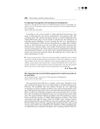Adipose Stem Cells from Type 2 Diabetic Mice Exhibit Therapeutic Potential in Wound Healing
May 2020
in “
Research Square (Research Square)
”
adipose-derived mesenchymal stem cells ASCs type 2 diabetic mice wound healing hepatocyte growth factor HGF vascular endothelial growth factor VEGF transforming growth factor β TGF-β skin fibroblast proliferation inflammation macrophage infiltration fat-derived stem cells diabetic mice wound repair skin cell growth immune cell infiltration
TLDR Stem cells from diabetic mice can still help heal wounds effectively.
Adipose-derived mesenchymal stem cells (ASCs) from type 2 diabetic (T2D) mice were found to be slightly less effective in promoting wound healing compared to control ASCs, as they secreted lower levels of hepatocyte growth factor (HGF), vascular endothelial growth factor (VEGF), and transforming growth factor β (TGF-β). Despite this, T2D ASCs still exhibited comparable therapeutic effects in wound healing, promoting skin fibroblast proliferation and migration, and suppressing inflammation and macrophage infiltration. The study concluded that ASCs from T2D mice, while marginally inferior, still held significant potential for therapeutic use in wound healing.






